Breakfast is the most important meal of the day a good start will arm you with the energy, micronutrients and protective polyphenols for your forthcoming physical and psychological challenges.
Breakfast is one of the few meals you will eat on a completely empty stomach so it’s vital you don’t expose your body to processed sugars or refined carbohydrates which have a high glycemic index. The health breakfast option is sugar free and packed with healthy nutrients and slow release energy sources. Refined sugars will be rapidly absorbed causing a surge in insulin and insulin growth factors (IGF), which encourage cancers to form and grow. This high insulin will rapidly deal with the absorbed sugar leading to a low blood sugar within an hour or two leading to fatigue and hunger encouraging you to eat more which, in turn, causes weight gain.
Despite this well-established physiological issue most breakfast snacks and cereals are packed with processed sugar. Even the supposed healthy granola or muesli has added table sugar or fructose containing honey and dried fruits. Many people still sprinkle sugar on top as well. It is hard therefore to actually fine convenient breakfast foods without sugar but they are beginning to be available albeit often in the “Free From” sections of the supermarkets. The grains and nuts provide slow release carbohydrates and healthy fats, which will provide energy through the day.
Grains such as wheat and oats also provide healthy protein, vitamin B and fibre. Unsweeted, convenient muesli’s are available but avoid those with added dried fruits. Most are are high in gluten unless you specifically buy the gluten free versions. Gluten is not a problem unless you have an intolerance. This could manifest itself as bloating, flatulence, irritable bowel like symptoms and fatigue. In the longer term gluten intolerance is linked to arthritis, lack of concentration, dementia and Parkinson’s disease. If you are prone to these gut symptoms try cutting out cereals (as well as bread and pasta) and see if this improves. In this case you would also have to visits the “Free From” sections looking for gluten free versions or stick to grain free products such as puffed rich as featured below. If you are still not sure ask for special test form your GP.
Breakfast is an opportunity to load up on your phytochemicals and polyphenols, which have direct anti-cancer and anti-inflammatory properties as well as protecting you from carcinogens via their anti-oxidant properties. This means when you leave your front door, you have on board the means to defend yourself from the car fumes, detergents, passive cigarette of vapor smoke, radiation, sun rays, pesticides and other carcinogen chemicals we are exposed to everyday. If you leave the intake of these foods until later in the day you may be less protected in the morning. Likewise, if you take a polyphenol rich supplement such as Pomi-T it would be idea to take it with your breakfast for the same reasons. Nuts and whole fruits are an ideal inclusion for these natural chemicals with also contain fibre, vitamin c and other essential micro-nutrients. Avoid dried fruits as they contain sulfites and have a very high fructose content.
Ingredients
- Nuts – Unsalted, unroasted – walnuts, Brazils, almonds, pine nuts (Half a cup)
- Legumes – Whole unsalted peanuts (a small hand full)
- Seeds – e.g Pumpkin, sesame (Tablespoon)
- Grain – Unsweetened muesli with no dried fruit (Tablespoon)
- Puffed unsweetened rice or gluten free grain flakes e.g Kallo or Rude health (One cup)
- Berries – Preferably organic eg redcurrants, blueberries or most ideally wild blackberries when in season. (Half a cup)
- Fruit – preferably organic, cut up strawberries banana, apple or whatever your preferred taste (half a cup)
- Crushed flaxseed (linseed) – eg Linwoods (heaped teaspoon)
- Soy and almond milk – oraganic & amp; unsweetened e.g Alpro (Half to a whole cup)
Preparation
A quick an easy dish to prepare with no actual cooking. There is some time and effort required to buy the ingredients but once you have them, apart from the fruit and milk, they last for some time. Ensure the fruit and berries are washed well and the nuts have been stores dry in a sealed darkened container and have no mold. Be careful with the flaxseed quantity. You can use the fruit, which is currently in season although these days may fruits are available all year round. It’s a good idea to alternate the fruits and nuts for variety and differences in nutritional content. Soy milk can be mixed with or alternated with almond milk and if not lactose in tolerance mixed with cows milk. When you have your bowl and ingredients, just mix them all up, add the milk and enjoy.
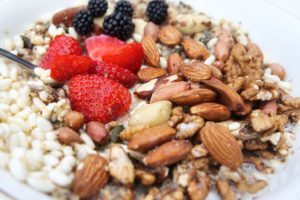
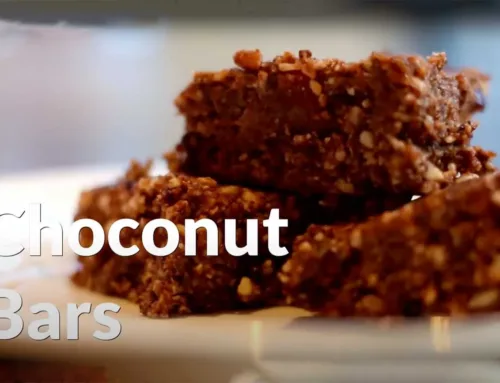
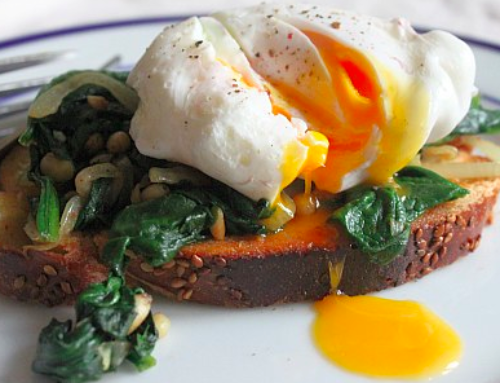

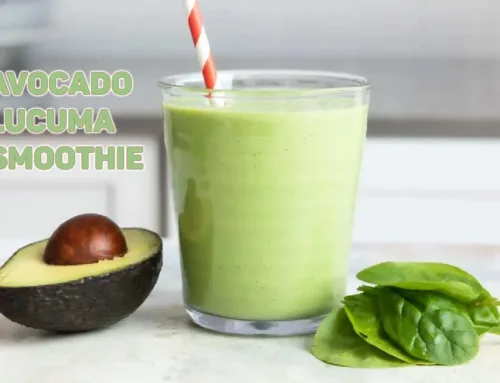
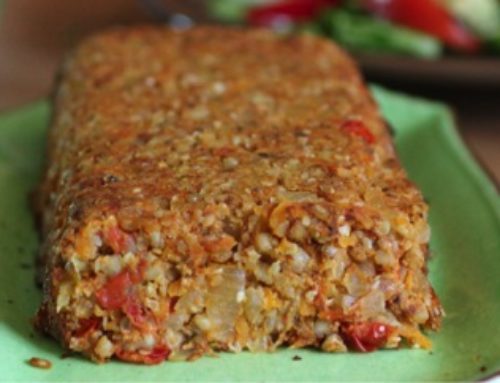
What about IBS food
What food good for IBS and triggers food to have